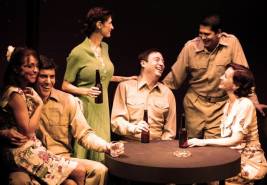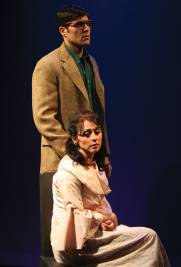
Nick Salamone’s exquisite The Sonneteer has the look and feel of a theatrical classic, yet it is one that could only have been written by a contemporary playwright.
Just as Arthur Miller did in his era-specific yet timeless All My Sons, Salamone’s multi-generational drama demonstrates with heartbreaking power the Biblical adage that “the sins of the father shall be visited upon the son,” though unlike the crimes committed by Joe Keller, The Sonneteer’s so-called “sins” stem from societal ignorance and intolerance.
At its core are longtime Italian American best buddies Joey (Ed F. Martin) and Michael (Ray Oriel), fellow WWII soldiers who realize that their feelings for each other far exceed simple friendship, a discovery which leads to tragic consequences.
With Stonewall still a quarter century in the future and society telling the couple that their love is at best a sin and at worst a monstrous perversion, a happily-ever-after ending is hardly in the cards for The Sonneteer’s pair of star-crossed lovers. When Michael’s Italian stallion of a brother Louie (Paul Haitkin) happens upon the couple mid-passionate kiss, Louie’s outrage proves more than Michael can handle, guilting him into marriage with Polish-Italian girl-next-door Ella (Victoria Hoffman). And as if this weren’t already enough for one tormented soul to handle, Michael accidentally backs a truck into Louie, causing his death and propelling himself into a downward spiral of despair.
If all the above seems more than a bit of a spoiler, fear not. Salamone’s non-chronological sequencing of events reveals these major plot points in the play’s first five or ten minutes, then lets the rest of Act One dig deep into the brothers’ family relationships, which also include their firecracker of a sister Vita (Cynthia Gravinese) and Louie’s tough-as-nails wife Livvy (Sandra Purpuro), whose sonnets about the abovementioned events and characters give Salamone’s play its title.
Act Two revisits the same characters some twenty-five years later, with Louie’s son Lucius (Haitkin again) an openly gay and openly partnered college professor, hardly what a pregnant Livvy was hoping for as she stood vigil over a husband whose death she still blames on Michael.
As unrelentingly “Greek Tragedy” as this all may sound, The Sonneteer’s cast of fiery Italians snap, crackle and pop with vitality and humor, and by not sticking to a linear ordering of events, particularly in the first act, a structure-savvy Salamone is able to avoid a steady descent into catastrophe.
The Sonneteer’s richly textured characters have been brought to vivid life by a couldn’t-be-better cast under the superbly nuanced direction of Jon Lawrence Rivera. Gravinese’s rich, multileveled performance as Vita avoids the Italian-American stereotype all the while remaining molto Italiana and very American. A mesmerizing Purpuro does her finest work to date as a woman turned icy by sorrow, who reveals her soul in a series of luminously performed sonnets. Martin is heartbreakingly real as a man who, decades before the gay liberation movement, saw himself and his same-sex relationship as normal, regardless of what the world around him thought. An unforgettable Oriel’s transformation from young-man-in-love to wrecked-bodied shell of a man is devastating. Hoffman is absolutely terrific as the scrappy Ella, making the best of life with a husband who only married her for show. Finally, a sensational Haitkin displays chameleon-like versatility in a pair of performances so dramatically distinct as to make one wonder if there were not two different actors onstage in Acts One and Two.
Master carpenter Robert Selander’s non-literal set design, with its sail-like scrims stretched out before walls filled with Livvy’s handwriting makes for a perfect fit with The Sonneteer’s non-linear structure, and when R. Christopher Stokes’ lighting design reveals the ghostlike figures of Salamone’s cast of characters from behind the scrims, the effect is both gorgeous and haunting. Shon LeBlanc’s splendid period costumes recreate the play’s 1940s, ‘50s, and ‘70s time frame, as does Bob Blackburn’s fine sound design. Fight choreographer Edgar Landa gets snaps for some Italian American fisticuffs and Samara Bay for her dialect coaching. Shaunessy Quinn is stage manager and assistant director, Raul Clayton Staggs casting director, and Jon Imparato producer.
Like Salamone’s previous Sea Change, Moscow, and Hillary Agonisties (all reviewed here), The Sonneteer reveals a playwright of considerable insight, imagination, and versatility. The Sonneteer, in particular, deserves to have a stage life far beyond its current World Premiere engagement at The Village.
The Davidson/Valentini Theatre, L.A. Gay & Lesbian Center, The Village at Ed Gould Plaza, 1125 N. McCadden Place, Los Angeles.
www.lagaycenter.org/boxoffice
–Steven Stanley
April 11, 2011
Photos: Katie Pomerantz





 Since 2007, Steven Stanley's StageSceneLA.com has spotlighted the best in Southern California theater via reviews, interviews, and its annual StageSceneLA Scenies.
Since 2007, Steven Stanley's StageSceneLA.com has spotlighted the best in Southern California theater via reviews, interviews, and its annual StageSceneLA Scenies.







 COPYRIGHT 2024 STEVEN STANLEY :: DESIGN BY
COPYRIGHT 2024 STEVEN STANLEY :: DESIGN BY